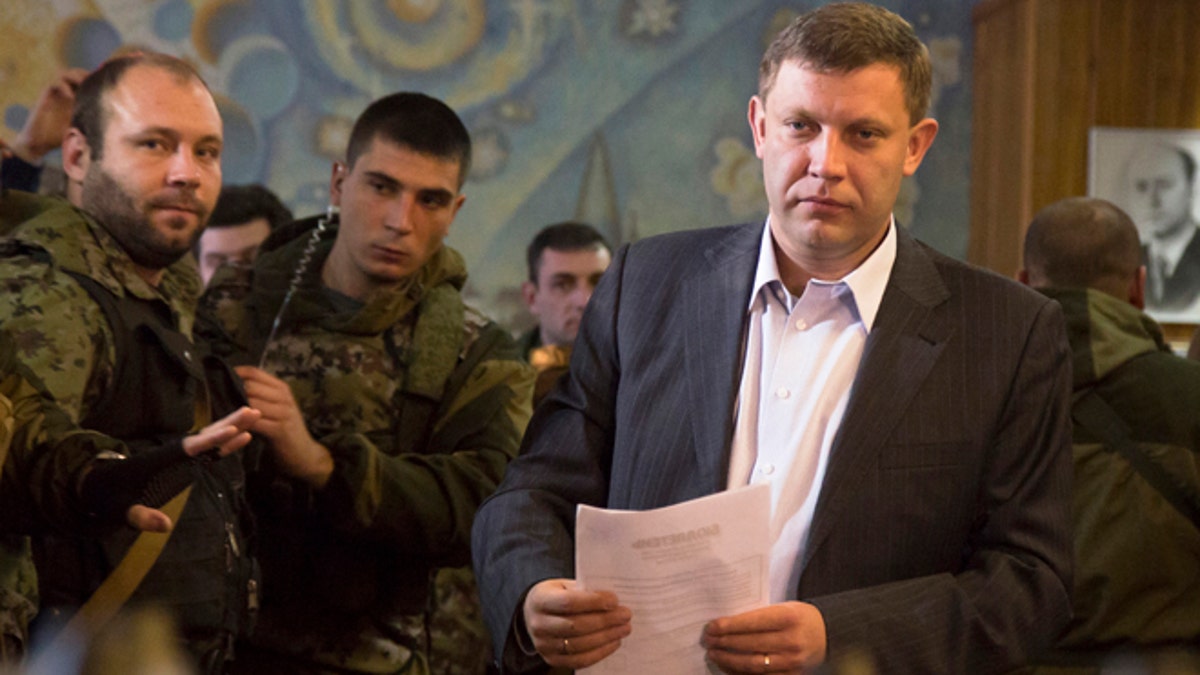
Nov. 2, 2014: Pro-Russian rebel leader Alexander Zakharchenko prepares to casts his ballot during supreme council and presidential elections in the city of Donetsk, eastern Ukraine. (AP)
DONETSK, Ukraine – Ukraine's president said Tuesday that additional troops are being deployed to the east, where fighting continues to rage between government forces and pro-Russian separatist fighters.
Petro Poroshenko said the units would defend cities still under government control against possible incursions.
His remarks came after Ukrainian security officials claimed over the weekend that Russia has intensified the transfer of troops and military equipment to separatist rebels. Moscow denies it aids the rebels.
"Several new units have been formed that will enable us to repel possible attacks in the direction of Mariupol and Berdyansk, Kharkiv, and areas north of Luhansk and the Dnipropetrovsk region," Poroshenko said, according to a statement on the presidential website.
Tensions have spiked since the weekend, when rebels held an election that was condemned by the West and Ukraine as illegal and destabilizing.
Ukraine and Western governments say Sunday's poll gravely endangered a much-violated cease-fire agreed upon in September that envisioned local elections across the whole of the east but under Ukrainian law. Russia, however, quickly lent its support to the vote.
German Chancellor Angela Merkel, underlining her displeasure over what she said was Russia's role in the conflict, said Tuesday there is no reason yet to lift European Union sanctions against Moscow. Merkel said she hopes for a diplomatic solution to Ukraine's crisis but added the vote shows "how difficult it is even to maintain agreements that have been made, if we look at the illegal elections."
On Tuesday morning, the separatist leader in the Donetsk region, Alexander Zakharchenko, 38, was sworn in as head of a self-declared secessionist territory.
He was inaugurated in a heavily guarded theater in the city of Donetsk, the main stronghold of a rebel-controlled territory that separatists call the Donetsk People's Republic.
Zakharchenko's election was largely a formality as no strong candidates opposed him, but the rebels say the vote gives them a mandate to pursue their secessionist goals.
Zakharchenko took the stage after four sabre-wielding Cossacks carried in the flag of the Donetsk People's Republic. He swore the oath of office with his hand on a Bible to applause and whistles from audience members -- many of them men in combat fatigues carrying automatic rifles.
Lawmakers from Russia and Georgia's breakaway republic of Abkhazia, whose independence is recognized only by Russia and three other countries, later mounted the stage. Russian lawmaker Alexei Zhuravlev congratulated Zakharchenko, declaring: "Russia doesn't give up on its own."
Post-inauguration entertainment included a traditional Russian dance troupe led by a performer in a bear suit.
The inauguration coincided with Russia's National Unity Day holiday, which saw rallies throughout the country, including one in Moscow that police estimated at 75,000 participants.
The march in the center of the capital included banners reading "Crimea is ours" -- the Ukrainian region annexed by Russia in March -- and "Novorossiya -- we are with you." The separatist Ukrainian regions are widely referred to by that name, which means "New Russia" and reflects the widespread opinion that eastern Ukraine is historically and ethnically part of Russia.
The rally in central Moscow incorporated mainstream political groupings, but hard-line nationalists held a separate march of several thousand in the suburb of Lyublino. Police arrested several demonstrators there who tried to light fires.
